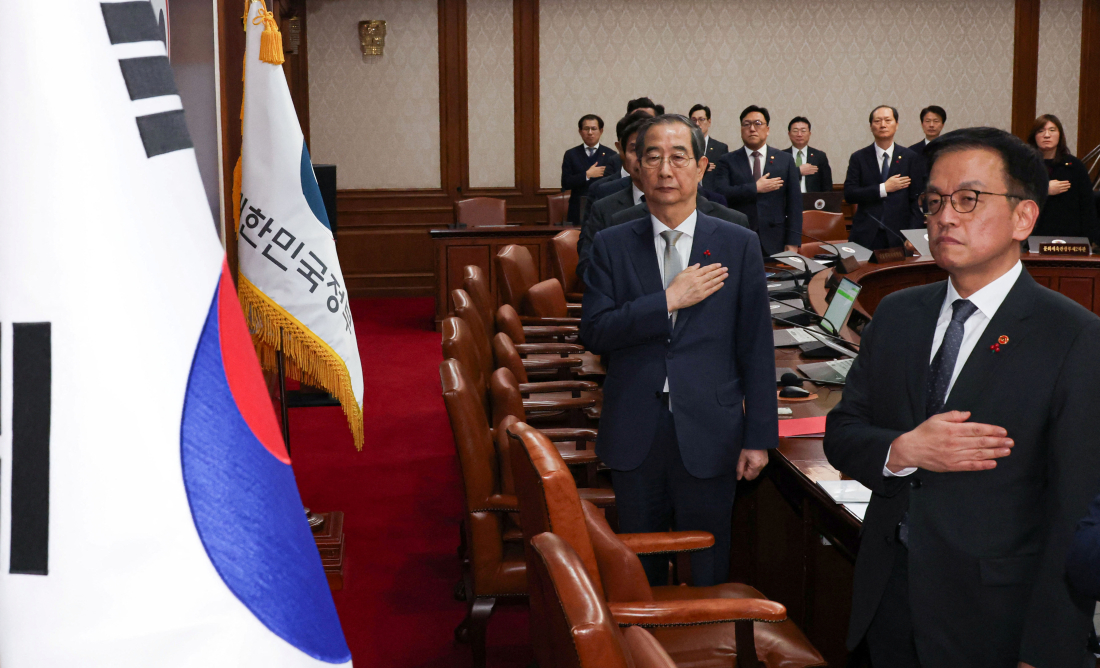live Israeli military says it has launched fresh strikes on Tehran and Beirut: All the latest news on the Iran strikes
The Israeli military has begun a new wave of strikes on Tehran, it said late on Monday. The strikes came after it issued...
South Korea's acting president, Han Duck-soo, moved quickly on Sunday to reassure allies and stabilize markets, pledging continuity in governance and security following President Yoon Suk Yeol's impeachment over a controversial martial law declaration.
South Korea's acting president, Han Duck-soo, moved swiftly on Sunday to reassure allies and calm financial markets following the impeachment of President Yoon Suk Yeol over a controversial martial law declaration. Speaking with U.S. President Joe Biden, Han emphasized continuity in foreign and security policies, underscoring the steadfastness of the South Korea-U.S. alliance.
The Democratic Party, which controls parliament, announced it would not seek Han's impeachment despite his connection to Yoon's martial law decision, citing the need to avoid further governance instability. As acting president, Han pledged to maintain military readiness and uphold national security.
Protests erupted in Seoul, with around 200,000 people demonstrating outside the National Assembly to support Yoon’s ouster, while smaller groups gathered in central Seoul to voice opposition to the impeachment. Public sentiment remains deeply divided, with critics accusing Yoon of undermining democracy and supporters lamenting political chaos.
The impeachment has drawn international attention amid rising tensions with North Korea. Biden reaffirmed U.S. support, praising South Korea's democratic resilience and emphasizing the importance of the alliance in maintaining Indo-Pacific stability.
Financial markets have reacted cautiously, with South Korean shares rising on hopes of political stabilization. The Constitutional Court now has six months to decide Yoon’s fate. If removed, new elections must be held within 60 days, leaving the country in a protracted period of uncertainty.
In the meantime, Han’s administration faces economic challenges, including sluggish domestic demand and a political deadlock over the national budget. Democratic Party leader Lee Jae-myung called for a supplementary budget and a National Stability Council to address economic concerns, including support for small businesses and energy infrastructure investment.
The unfolding political crisis has tested South Korea’s institutions, with acting President Han seen as a steadying figure. However, the coming months will determine whether the nation can navigate these challenges while maintaining stability at home and abroad.

Follow the latest developments and global reaction after the U.S. and Israel launched “major combat operations” in Iran, prompting retaliation from Tehran.
Saudi Arabia’s state oil giant Saudi Aramco closed its Ras Tanura refinery on Monday following an Iranian drone strike, an industry source told Reuters as Tehran retaliated across the Gulf after a U.S.-Israeli attack on Iranian targets over the weekend.
The Kremlin is utilising the recent United States and Israeli military strikes on Iran to validate its ongoing war in Ukraine. Russian officials are pointing to the escalation in the Middle East as evidence that Western nations do not adhere to international rules.
The Middle East crisis intensifies after the deadly attack on the compound of the Supreme Leader of Iran Ali Khamenei on Saturday that killed him, other family members and senior figures. Iran has launched retaliatory strikes on U.S. targets in the region.
Ayatollah Alireza Arafi has moved into a pivotal constitutional role following the death of Supreme Leader Ayatollah Ali Khamenei, becoming the clerical member of Iran’s temporary leadership council under Article 111 of the Constitution of the Islamic Republic of Iran.
Start your day informed with AnewZ Morning Brief. Here are the top news stories for the 3rd of February, covering the latest developments you need to know.
Canadian Prime Minister Mark Carney arrived in Australia on Tuesday (3 March), aiming to bolster relations between the two so-called "middle powers" amid what he has called a "rupture" in world order.
Former U.S. President Bill Clinton told lawmakers that President Donald Trump told him he had "some great times" with convicted sex offender Jeffrey Epstein before their relationship soured, according to a video released on Monday (2 March).
The U.S.-Iran crisis has entered its third day, with further strikes reported across the Middle East and the death toll rising. Oil prices have surged to levels last seen during the Covid-19 pandemic, raising fears of economic disruption and higher prices worldwide.
The UK said it's allowing the U.S. to use its bases for defensive strikes against Iran amid escalating missile attacks, after a suspected drone strike hit a British airbase in southern Cyprus, causing limited damage.
You can download the AnewZ application from Play Store and the App Store.

What is your opinion on this topic?
Leave the first comment